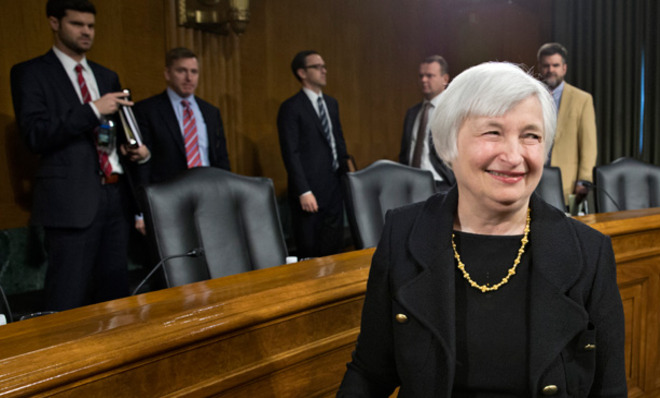Janet Yellen, Christine Lagarde, and a new era for women in finance
The new Fed chair is arguably the most powerful woman on Earth

A free daily email with the biggest news stories of the day – and the best features from TheWeek.com
You are now subscribed
Your newsletter sign-up was successful

Only a few years ago, if you had randomly asked people around the world to name the woman who in their countries had the most influence in the financial sector, many millions — perhaps billions — would have been stumped. The world of finance, particularly cross-border finance, has long been dominated by men.
To some extent, it still is, evidenced by the furor over the dearth of female attendees at the World Economic Forum in Davos last month. But as of today, there will be virtually no country on the planet where decisions made by one of two women are not a major factor in the financial sector.
Today, of course, is the day Janet Yellen will be sworn in as chair (not chairman or chairwoman, but chair) of the Federal Reserve Board. With the job comes leadership of the Federal Open Market Committee, putting her in charge of the most obsessed-about decision in the financial world, the setting of the Fed's interest rate target.
The Week
Escape your echo chamber. Get the facts behind the news, plus analysis from multiple perspectives.

Sign up for The Week's Free Newsletters
From our morning news briefing to a weekly Good News Newsletter, get the best of The Week delivered directly to your inbox.
From our morning news briefing to a weekly Good News Newsletter, get the best of The Week delivered directly to your inbox.
On becoming the first female head of the Fed, Yellen will join Christine Lagarde, the Frenchwoman who in 2011 became the first woman to head the International Monetary Fund. Together they are now the most important players in the world of international finance.
In the industrialized West, where the markets and policymakers will minutely scrutinize Yellen's decisions about interest rates, there can be little question about the centrality of her decisions to the world of economics.
Lagarde's influence is, primarily, in a different area. The 188 countries that make up the membership of the IMF jointly provide advice and financing to developing countries worldwide, where billions of people's livelihoods depend on streams of financing that Lagarde's organization keeps flowing.
The two women now at the pinnacle of the international financial world appear at first to be quite different — Lagarde the jet-setting international business attorney-turned-politician and Yellen, the scholarly economist — but they share similar backgrounds.
A free daily email with the biggest news stories of the day – and the best features from TheWeek.com
Yellen, the daughter of a doctor, was born and raised in Brooklyn, while Lagarde, the child of two academics, was born in Paris but raised in the significantly less glamorous port city of Le Havre.
Both distinguished themselves academically, and before they were out of their 40s had taken leading positions in their respective countries' financial establishments. Yellen joined the Federal Reserve Board in 1994, and later served as president of the Federal Reserve Bank of San Francisco before returning to the Fed Board in 2010. Lagarde became the French Minister of Commerce and Industry in 2005, and later served as Minister of Agriculture before becoming Minister of Finance in 2007.
In an appearance in Washington last month, Lagarde was asked to comment on the significance of Yellen's appointment to head the Fed, as well as the recent news that General Motors had named executive Mary Barra as its next CEO, making her the first woman to head a global automaker.
Her reaction was to simply say, "Women can do anything." After a round of applause, she added, "Especially Janet."
Lagarde noted that on a recent trip to Africa, "I met with representatives of the corporate sector in Kenya and was really happy to see that the head of GM in Kenya and two other countries was a woman as well. So it's not as though it was a token appointment."
She then turned serious, saying that the change toward more women in leadership roles in business and finance is "very welcome," but ended with a warning.
"There is a clear potential that is being tapped, and I hope it will continue to be tapped," Lagarde said. "But I think it requires constant vigilance."
More from The Fiscal Times...
-
 Political cartoons for February 22
Political cartoons for February 22Cartoons Sunday’s political cartoons include Black history month, bloodsuckers, and more
-
 The mystery of flight MH370
The mystery of flight MH370The Explainer In 2014, the passenger plane vanished without trace. Twelve years on, a new operation is under way to find the wreckage of the doomed airliner
-
 5 royally funny cartoons about the former prince Andrew’s arrest
5 royally funny cartoons about the former prince Andrew’s arrestCartoons Artists take on falling from grace, kingly manners, and more